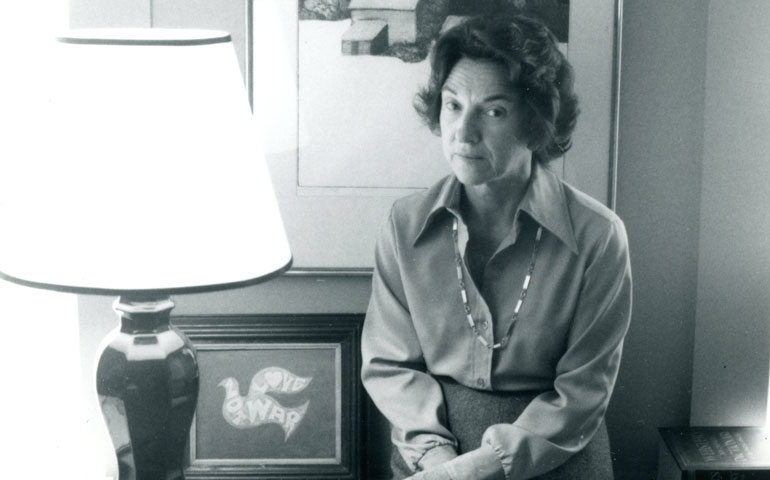
Ruth Sivard (Courtesy of Susan Sivard)
Economic violence, a phrase rarely uttered in policy debates, was a reality to which Ruth Sivard devoted her professional life. At her death in Washington, D.C., Aug. 21 at age 99, she had spent decades exposing the lethal results when governments choose to invest more money on armies and weapons than social needs, more money killing than healing. She took to heart the exhortation of Martin Luther King Jr.: "A nation that continues year after year to spend more money on military defense than on programs of social uplift is approaching spiritual death."
From the anti-war movement of the 1960s through the U.S. invasions of Iraq, Sivard was the one-woman founder and researcher of World Priorities. It was a Washington-based, foundation-supported nonprofit that went well beyond asking questions about U.S. military policies to questioning the violence-based answers supplied by pro-war congressional committees and federal agencies that often enough were the fronts of military contractors.
At $5 a copy, her periodically issued reports of facts, figures and conclusions -- "World Military and Social Expenditures" -- had a circulation between 25,000 and 30,000, but when the reports were quoted by the major print and electronic media, the audience was in the millions. Usually running to 40 or 50 pages, the reports began in 1974.
In the 10th edition, a decade later, Sivard wrote:
In contrast to the military world of plenty, the real world of the 1980s is one of increasing disparity within, as well as between nations and crushing poverty for at least one-quarter of humanity. There are more unemployed, more illiterates, more homeless, more people without health services, more unable to satisfy basic needs for food and clean water. ... There is no global security. Government authorities who expect to achieve it through military power and the suppression of protest have lost touch with reality and their own sense of humanity.
Much of that could be written today.
A graduate of Smith College in 1937 and New York University with a master's degree in 1943, Sivard's earliest employer was the federal Office of Price Administration.
At the end of World War II, she worked for the International Refugee Organization in Switzerland and the United Nations. Settling in Washington with her husband, Robert Sivard, she took her analytic skills to the Arms Control and Disarmament Agency, believing that official Washington would value her economic analysis of the military and social budgets.
She would learn otherwise. Congress cut the agency's budget, with a hatchet aimed specifically at Sivard's work. She got the message -- hush up -- and left the agency in 1973, saying it was "not a climate I felt I could achieve anything in."
Along with a fair number of media people in need of grounded information, I was a frequent visitor to Sivard's office, which was a second-floor study in her Georgetown home and from where she published her World Priorities reports (available today at ruthsivard.com).
I never sensed any discouragement at the idea that her efforts to rouse the public appeared to have little effect, as congressional funding for military spending kept soaring, at one point coming to $27,000 per second.
"We are all involved," she said. "The money comes out of our pockets, and it may kill us."
Sivard felt bonded with many of those in the anti-war movement who specialized in reporting the numbers, including the American Friends Service Committee and its findings that nearly 60 percent of federal discretionary spending goes to military programs. Again, there was King: "It is a tragic mix-up when the United States spends $500,000 for every enemy soldier killed [in Vietnam] and only $53 annually on the victims of poverty."
Sivard's dispassion and persistence brings to mind the fable of the Buddhist spiritual master who descended to the town square every day to cry out against war. His daily calls for peace went on for years.
His disciples, seeing he was getting nowhere, begged him to cease: "No one cares. The townspeople aren't listening. They're insane."
"No," said the spiritual master, "I have to keep crying out against war so I won't go insane."
Sivard, ever in touch with reality, never did.
[Colman McCarthy directs the Center for Teaching Peace in Washington, D.C.]




